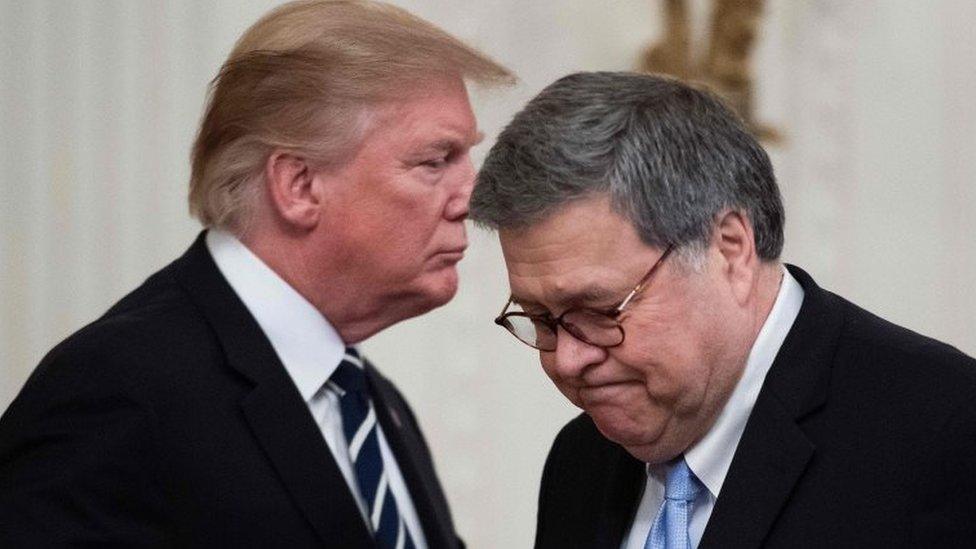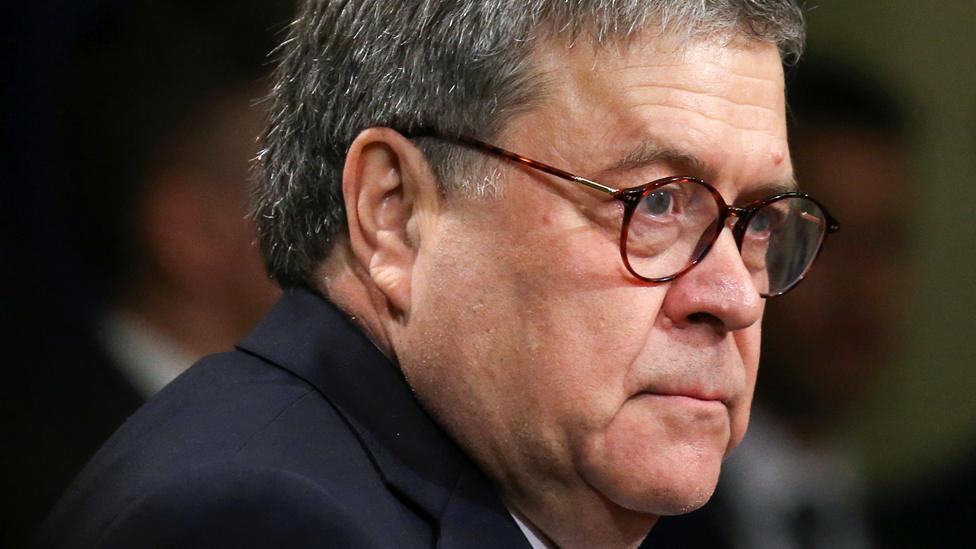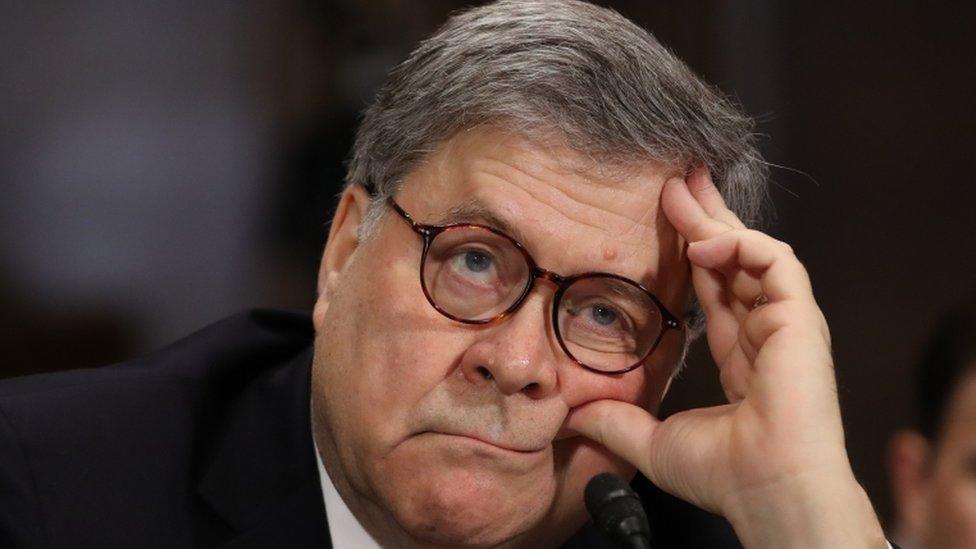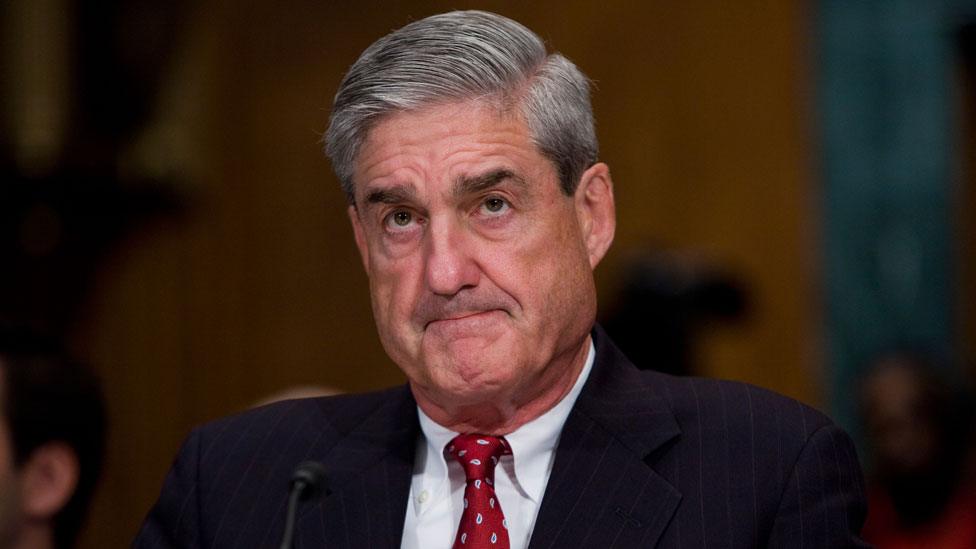Trump orders new powers for Attorney General's surveillance probe
- Published

US Democrats have accused Mr Barr of acting on behalf of the president
US President Donald Trump has ordered US intelligence agencies to co-operate with an investigation into whether he was spied on during the 2016 election.
The probe, headed by Attorney General William Barr, is examining the origins of the Russia investigation.
It has long been requested by Mr Trump, who often labels the inquiry into Russian interference a "witch hunt".
On Thursday he announced a directive that gave Mr Barr sweeping new powers, including to declassify documents.
Mr Barr is already subject to intense scrutiny and criticism by Democrats - who have accused him of acting on the president's behalf and not in the national interest.
What is the new investigation?
The president has repeatedly suggested his campaign was spied on and accused intelligence agencies of abusing their power.
He has also said this could amount to "treason" and has suggested those involved should be criminally prosecuted.
Allow X content?
This article contains content provided by X. We ask for your permission before anything is loaded, as they may be using cookies and other technologies. You may want to read X’s cookie policy, external and privacy policy, external before accepting. To view this content choose ‘accept and continue’.

In April, the attorney general told Congress that "spying did occur" on the Trump campaign, and said he wanted to ensure that any intelligence-gathering had been legitimate.
Earlier this month, Mr Barr assigned a federal prosecutor to look at the origins of the Russia investigation. Mr Trump has denied asking Mr Barr to do so.
Thursday's memorandum directs the heads of intelligence agencies to "promptly provide" information to Mr Barr upon his request.
"Today's action will help ensure that all Americans learn the truth about the events that occurred, and the actions that were taken, during the last presidential election and will restore confidence in our public institutions," press secretary Sarah Sanders said.
What did the Russia investigation find?
After almost two years, a redacted version of the report compiled by special counsel Robert Mueller was released in April.
The report concluded that Russia had interfered in the 2016 presidential election "in sweeping and systematic fashion" but did not find there had been a criminal conspiracy between Moscow and the Trump campaign.
It did, however, detail 10 instances where Mr Trump had possibly attempted to impede the investigation.
After the report was released, Mr Barr was accused of mischaracterising its findings in a previously released summary.
Why did the chicken go to Congress?
He has since failed to appear before the House Judiciary Committee and has been held in contempt for failing to provide them an unredacted version of the report.
Mr Mueller himself said he was "frustrated" by Mr Barr's summary, saying it lacked context.

An open question
Anthony Zurcher, North America reporter, BBC News
Now comes the counter-attack
For nearly two years, Donald Trump was buffeted by an investigation into his presidential campaign conducted from within his own justice department. Now that the Robert Mueller inquiry has concluded, the administration's investigatory powers - heralded by the attorney general - are being directed at those who began the investigation.
The president has long railed against the Russia inquiry as an illegitimate hoax designed to "spy" on him and his associates. On Thursday he stood by his accusation that senior intelligence agency officials involved in the investigation had committed "treason" - even after being reminded by a reporter that the punishment for treason is death.
Just what, if anything, Attorney General Barr will unearth with his newly granted powers to request and declassify intelligence agency documents is an open question. He speculated during recent congressional hearings that what the public knows about government surveillance of members of the Trump 2016 campaign team may not be the whole story.
At the very least, however, the president can now claim that he has turned the tables on his long-time antagonists. His supporters will be thrilled. Democrats will call it a distraction. And the political battles rage on.

How have Democrats reacted?
The chairman of the House Intelligence Committee is among those who have criticised the expanded power announcement.
"Trump and Barr conspire to weaponise law enforcement and classified information against their political enemies," Adam Schiff said on Twitter.
"The cover-up has entered a new and dangerous phase. This is un-American," he added.
Allow X content?
This article contains content provided by X. We ask for your permission before anything is loaded, as they may be using cookies and other technologies. You may want to read X’s cookie policy, external and privacy policy, external before accepting. To view this content choose ‘accept and continue’.

This comes at a time of already high tension between senior Democrats and President Trump.
He and House Speaker Nancy Pelosi traded barbs on Thursday about each other's mental stability after Mr Trump abruptly cut short a meeting earlier this week.
Mr Trump has announced the end of all bipartisan co-operation with the Democrats until they end all their investigations into him.
Trading insults: "Trump needs intervention" v "Crazy Nancy"
Mr Barr is himself subject to intense scrutiny and criticism. He has been accused of acting on the president's behalf and not in the national interest.
Mrs Pelosi has accused Mr Barr of committing a crime by lying to Congress during one hearing regarding the report - an allegation he dismissed as "laughable".
- Published14 May 2019

- Published9 May 2019

- Published18 April 2019

- Published9 May 2019